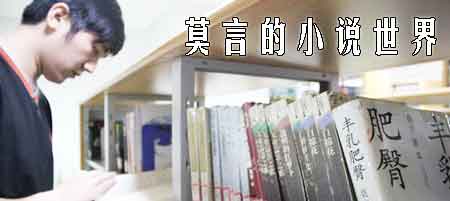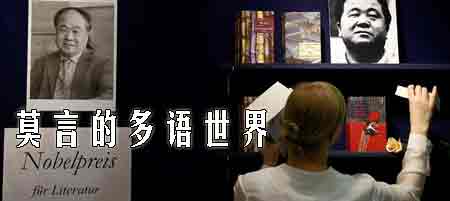當(dāng)前位置: Language Tips> 名著選讀
分享到

莫言有句名言說:"土是我走向世界的重要原因。"莫言"土"在何處?這捧質(zhì)樸而魔幻的"中國(guó)土"是如何打動(dòng)了世界?奉上莫言的五大經(jīng)典作品解析。凈土五方,花開正艷。
★溯源之土:《豐乳肥臀》
(Big Breasts and Wide Hips)
"你可以不看我其它所有的作品,但你應(yīng)該看我的《豐乳肥臀》。"——莫言
"If you like, you can skip my other novels, but you must read 'Big Breasts and Wide Hips'. " - Mo Yan
[主題與賞析]
這部小說首先是一部關(guān)于女性的作品。題目"豐乳肥臀"代表女性身體,這是作品中最重要的意象和隱喻。
This novel is first and foremost about women. As the title implies, the female body serves as the book's most important image and metaphor.
主人公是一位母親,她養(yǎng)育了9個(gè)孩子,8女1男。男孩嬌生慣養(yǎng)、性格懦弱,這與他個(gè)性剛烈的姐姐們形成了鮮明對(duì)比。堅(jiān)強(qiáng)的母親傾其一生拯救她的家庭。
The protagonist, the Mother, has 9 children, only one of whom is a boy, a spoiled and ineffectual child who stands in stark contrast to his 8 strong and forceful female siblings. Mother is a strong woman, who risks her life to save the lives of her family.
小說的寫作風(fēng)格非常生活化——描繪生動(dòng)、用詞粗俗、富有想象力。全篇分為7個(gè)章節(jié),每個(gè)章節(jié)展示一個(gè)時(shí)間段里的故事,從清末一直延續(xù)到上世紀(jì)末。
The writing is full of life - picturesque, bawdy, imaginative. Each of the 7 chapters represents a different time period, from the end of the Qing Dynasty up through the end of the 20th century.
[評(píng)價(jià)]
《豐乳肥臀》描繪的是一個(gè)家庭的故事,卻從廣闊的歷史視角展示了20世紀(jì)中國(guó)的面貌。——諾貝爾評(píng)選委員會(huì)
"Big Breasts and Wide Hips" is a broad historical fresco portraying 20th-century China through the microcosm of a single family. - Nobel Committee
莫言強(qiáng)烈的女性崇拜傾向貫穿整部小說。我很驚訝他是怎樣做到將魔幻現(xiàn)實(shí)主義完美融合在社會(huì)現(xiàn)實(shí)題材中的。——杰夫·福克曼(讀者)
Mo Yan's strong feminist beliefs are very apparent throughout the novel. I was amazed at how Mo Yan incorporated magical realism into a social commentary. - Jeff Volkmann
★魔幻之土:《生死疲勞》
(Life and Death are Wearing Me Out)
這是一部引人入勝的巨著,傾注了作者對(duì)這片土地深切的愛,盡管它也存在太多疾患,有傳統(tǒng)的,也有現(xiàn)代的。——亞馬遜網(wǎng)站
This is an absolutely spellbinding tale that reveals the author's love of the land, beset by so many ills, traditional and modern. - Amazon.com
[主題與賞析]
故事的講述從地獄開始,閻羅王正在審訊地主西門鬧。西門鬧土改時(shí)被擊斃,土地分給了農(nóng)民。陰間的西門鬧拒不認(rèn)罪,閻羅王于是讓他轉(zhuǎn)世托生,變成他自家土地上的一頭驢。后來他又一世為牛,一世為豬,一世為狗,一世為猴。通過這些動(dòng)物的視角,西門鬧"見證"了中國(guó)50年的鄉(xiāng)村史。
The story begins in hell, where Lord Yama, king of the underworld, is examining a landowner named Ximen Nao, who was executed so that his land could be redistributed to peasants. Since Ximen will not admit any guilt, Yama punishes him by sending him back to his own farm, where he is reborn first as a donkey, then an ox, pig, dog and monkey. Through the perspectives of these animals, Ximen narrates 50 years of rural Chinese history.
[評(píng)價(jià)]
《生死疲勞》用黑色幽默向我們描述了新中國(guó)初期的日常面貌和過分扭曲的社會(huì)現(xiàn)實(shí)。——諾貝爾評(píng)選委員會(huì)
"Life and Death are Wearing Me Out" uses black humor to describe everyday life and the violent transmogrifications in the young People's Republic. - Nobel Committee
★歷史之土:《紅高粱家族》
(Red Sorghum)
《紅高粱家族》這本書是寓言和歷史碰撞的產(chǎn)物,這種嘗試是全新的,也是令人難以忘懷的。——亞馬遜網(wǎng)站
"Red Sorghum" is a book in which fable and history collide to produce fiction that is entirely new - and unforgettable. - Amazon.com
[主題與賞析]
《紅高粱家族》中共有5個(gè)故事,展現(xiàn)了20世紀(jì)數(shù)十年的歷史動(dòng)蕩,描述了土匪文化、日本侵華以及貧苦農(nóng)民的艱難處境。張藝謀電影《紅高粱》的劇本就基于這5個(gè)故事中的兩個(gè)。
"Red Sorghum" consists of 5 stories that unfold in several turbulent decades in the 20th century, with depictions of bandit culture, the Japanese occupation and the harsh conditions endured by poor farmers. Two of the 5 stories formed the basis of Zhang Yimou's film.
這是一部3代人的家族秘史,用倒敘的方式講述了上世紀(jì)30年代發(fā)生在如歌大地上的風(fēng)云變幻。幾乎每一頁(yè)都用極其生動(dòng)的筆觸,將戰(zhàn)爭(zhēng)時(shí)期的恐怖和幽默描寫得活靈活現(xiàn)。
Spanning 3 generations, this novel of family and myth is told through a series of flashbacks that depict events set against a landscape of gemlike beauty in the turbulent 1930s. On almost every page, the horror and humor of war time are brought to life in graphic detail.
[評(píng)價(jià)]
歷史的畫卷很難被裝進(jìn)小說的畫框。但是一旦成功,結(jié)果就是某段時(shí)空被噴薄的想象照亮。——《紐約時(shí)報(bào)》
The canvas of history rarely stretches comfortably over the frame of fiction. But when it succeeds, the result can illuminate a time and place as it excites the imagination. - The New York Times
★殘酷之土:《天堂蒜薹之歌》
(The Garlic Ballads)
史詩(shī)般的巨著,充斥著殘酷和美。——亞馬遜網(wǎng)站
An epic novel of beauty and brutality. - Amazon.com
[主題與賞析]
故事發(fā)生在天堂縣。當(dāng)?shù)卣賳T鼓勵(lì)農(nóng)民種植蒜薹。但農(nóng)民們沒有想到的是,由于市場(chǎng)飽和,蒜薹賣不出去。主人公們經(jīng)歷了爭(zhēng)吵、流血、低聲下氣。小說描繪了人們的生活困境,但字里行間那股鮮活的生命力,讓故事從未墮入黑暗。
The setting of this novel is called Paradise County, where the farmers have been encouraged by county officials to plant garlic; but selling the crop during a surfeit is not as simple as they believed. The characters brawl, bleed and grovel. Yet, despite the bleakness of life, the tale is so full of seething vitality that it never sinks into gloom.
《天堂蒜薹之歌》有力地展現(xiàn)了生活的殘酷。同時(shí),它也是一個(gè)細(xì)致入微的關(guān)于愛的故事,它講述了男女之愛,父子之愛,朋友之愛,以及在困境面前為了維系那份愛而做出的掙扎。
"The Garlic Ballads" is a powerful vision of the cruelty of life. It is also a delicate story of love between man and woman, father and child, friend and friend - and the struggle to maintain that love despite overwhelming obstacles.
[評(píng)價(jià)]
是《天堂蒜薹之歌》使莫言成為了大作家,成為了中國(guó)版的魔幻現(xiàn)實(shí)主義者。他的小說根植于現(xiàn)實(shí)自然主義,帶有真實(shí)生活的氣息和律動(dòng);盡管它同樣充斥著幻想、惡魔的附體和夢(mèng)的荒誕。——《紐約時(shí)報(bào)》
With "The Garlic Ballads", Mr Mo has emerged as a major writer, a kind of Chinese magical realist whose stories, grounded in gritty naturalism, in the smells and fluids of real life, are nonetheless full of hallucination, demonic possession and the grotesquery of dreams. - The New York Times
★靈魂之土:《蛙》(Frog)
"作家要勇于寫靈魂深處最痛的地方。"——莫言
"A writer should be brave to touch the sourest part deep in the soul. " - Mo Yan
[主題與賞析]
小說的主人公姑姑是一個(gè)十分復(fù)雜的人物。一方面,她是一位優(yōu)秀的助產(chǎn)士和婦產(chǎn)科醫(yī)師,將數(shù)以千計(jì)健康的嬰兒接生到這個(gè)世界。另一方面,她也是一位忠誠(chéng)的黨員,是計(jì)劃生育政策的忠實(shí)執(zhí)行者。
The woman protagonist in this novel, the Aunt, is a complex character. On the one hand, as a brilliant midwife and gynecologist, Aunt brings thousands of healthy babies into the world. On the other hand, as a loyal Communist Party member, she faithfully defends the family planning policy.
小說的題目《蛙》具有多重涵義。首先,它是神話中造人補(bǔ)天的女媧的"媧"的同音字;其次,它很像娃娃的"娃";再次,蛙在中國(guó)一些地方也是一種生殖崇拜的圖騰。
The title, Wa, has different meanings. First of all, it is a homophone, part of the name nvwa (女媧), the legendary goddess who created human beings and patched up the sky. Secondly, this character is close to wa (娃), meaning "child". Thirdly, frogs are known for their fertility and thus are totemic animals in certain areas of China.
[作者自述]
"寫作的根本目的不是對(duì)某項(xiàng)政策的批判,而是對(duì)人性的剖析和自我救贖。寫人的靈魂,寫人的懺悔,這也許就是《蛙》這部作品的價(jià)值所在。"——莫言
"The fundamental goal of writing is not criticizing a certain policy, but dissecting humanity and self-redemption. Reaching out for human souls and repentance, this might be the true value of the novel 'Frog'." - Mo Yan

文學(xué)諾獎(jiǎng)宣布后,莫言"狂喜",國(guó)人"狂歡"。而在西方,數(shù)名漢學(xué)家更是由衷地驕傲。某種意義而言,沒有他們,莫言不可能得到西方文學(xué)界的認(rèn)可。
[值得關(guān)注的翻譯大師]
迄今為止,莫言的作品已被翻譯成近20種文字。鑒于瑞典文學(xué)院院士多精通英語、法語、德語、西班牙語和瑞典語,把莫言作品翻譯成上述語種的漢學(xué)家們更是功不可沒。
Mo Yan's works have been translated into nearly 20 languages so far. The academicians for the Royal Swedish Academy of Letters are basically versed in English, French, German, Spanish and Swedish. That's the reason why those translating Mo's novels into those languages are worth commending for their roles in the Nobel award.
莫言作品的主要翻譯大師:
Anna Gustafsson Chen 陳安娜(瑞典語)
Howard Goldblatt 葛浩文(英語)
Chantal Chen-Andro 尚德蘭(法語)
Peter Weber-Schafer 皮特·韋伯-謝法(德語)
Cora Tiedra 科拉·鐵德拉(西班牙語)
[中國(guó)當(dāng)代文學(xué)'接生婆']
美國(guó)漢學(xué)家葛浩文被喻為中國(guó)現(xiàn)當(dāng)代文學(xué)的"首席接生婆",得益于他的翻譯,英語世界國(guó)家才有可能了解蕭紅、白先勇、楊絳、馮驥才、賈平凹、蘇童、王朔、莫言等華語作家。2008年,暢銷小說《狼圖騰》英文版發(fā)行,譯者葛浩文更是被國(guó)內(nèi)文學(xué)界所認(rèn)可。
Professor Howard Goldblatt (see photo), a US researcher of Chinese, was hailed as the "chief midwife" of contemporary Chinese literature. The novel translator introduced quite a few Chinese men of letters, including Xiao Hong, Bai Xianyong, Yang Jiang, Feng Jicai, Jia Pingwa, Su Tong, Wang Shuo as well as Mo Yan to English-speaking countries. Goldblatt was widely recognized by Chinese literature circles in 2008 when his English translation of the popular Chinese novel "Wolf Totem" was published.
葛浩文"邂逅"莫言始于《紅高粱》。他當(dāng)時(shí)是在朋友家讀到了這部小說,一時(shí)沖動(dòng)得不能自已,他對(duì)自己說:"這才是我想翻譯的東西!" 1993年,《紅高粱》英譯本發(fā)行后,他又先后翻譯了近十部莫言的小說,其中包括《天堂蒜薹之歌》、《豐乳肥臀》、《生死疲勞》和《檀香刑》。
It is Mo's "Red Sorghum" that motivated Goldblatt to translate more works by Mo. He got very excited after first reading the novel at a friend's home, saying it really was works he desired to translate. After the English version of "Red Sorghum" was published in 1993, Goldblatt spent years translating nearly 10 more novels by Mo, including "The Garlic Ballads", "Big Breasts and Wide Hips", "Life and Death are Wearing Me Out" and "Sandalwood Death".
[獨(dú)家采訪葛浩文實(shí)錄]
諾獎(jiǎng)公布前,《中國(guó)日?qǐng)?bào)》對(duì)葛浩文進(jìn)行了獨(dú)家采訪,采訪完整版見10月10日英文版《中國(guó)日?qǐng)?bào)》。由以下采訪實(shí)錄節(jié)選,我們可洞悉一位諳熟中國(guó)文學(xué)的美國(guó)人如何看待莫言以及中國(guó)諾獎(jiǎng)夢(mèng):
--問:您最喜愛莫言的哪部作品?
Q: Which are your favorite works by Mo Yan?
葛浩文:我真心喜歡并享受翻譯莫言的所有小說,而且原因各異。
Goldblatt: I truly like, and enjoy translating, all of Mo's fiction and usually for different reasons.
比如,在我讀過的中國(guó)小說里,《酒國(guó)》可能是在創(chuàng)作手法方面最具革新性、寫作技巧最為圓熟的作品;《生死疲勞》堪稱才華橫溢的長(zhǎng)篇寓言;《檀香刑》如作者所希望的,極富樂感之美。
For instance, "The Republic of Wine" may be the most technically innovative and sophisticated novel from China I've read; "Life and Death are Wearing Me Out" is a brilliant extended fable; "Sandalwood Death" is, as the author contends, musical in its beauty.
--問:您能否比較一下莫言和其他當(dāng)代中國(guó)作家的作品?
Q: Could you compare Mo's works with those of other contemporary Chinese writers?
葛浩文:與同時(shí)代作家相比,莫言更有"歷史感"。他的作品很少涉及現(xiàn)代都市題材,這似乎是現(xiàn)在最熱門的主題。
Goldblatt: Mo tends to be more "historical" than many of his contemporaries. Few of his works deal with up-to-date urban themes, which appear to be all the rage these days.
--問:您能就寫作風(fēng)格、題材等方面將莫言與相近的西方作家做個(gè)比較嗎?
Q: Can you think of any similar Western writers in style, content or others?
葛浩文:當(dāng)我閱讀莫言的作品時(shí),我時(shí)常會(huì)想到狄更斯(我知道他不是當(dāng)代作家):他們的作品都是圍繞著鮮明道義核心的鴻篇巨制,大膽、色彩濃烈、意象鮮明、有張力。可以相提并論的作品還有威廉·弗爾曼的《歐洲中心》,它和莫言的《紅高梁》系列一樣擁有宏大的歷史敘述,也像《天堂蒜薹之歌》那樣,表達(dá)了對(duì)強(qiáng)權(quán)者暴行的猛烈抨擊。
Goldblatt: When I read Mo I'm often reminded of Dickens (I know he's not a contemporary): big, bold works with florid, imagistic, powerful writing and a strong moral core. I see parallels with works like William Vollmann's "Europe Central", with its historical sweep (Red Sorghum) and trenchant criticism of monstrous behavior by those in power (The Garlic Ballads).
當(dāng)然,還有那些莫言自己也比較喜歡的作家,如現(xiàn)代主義的福克納,魔幻現(xiàn)實(shí)主義的加西亞·馬爾科斯,還有日本的大江健三郎。
And, of course, there are writers Mo seems to prefer, the modernist Faulkner, the magic-realist Garcia Marquez, and the Japanese Oe Kenzaburo.
--問:中國(guó)人對(duì)諾貝爾文學(xué)獎(jiǎng)非常關(guān)注,您對(duì)此有何看法?
Q:What do you think of the attention the Chinese put on the Nobel Prize in literature?
葛浩文:我對(duì)這個(gè)獎(jiǎng)本身沒什么看法;但是這么多人對(duì)這個(gè)獎(jiǎng)如此癡迷卻令我感到不安。對(duì)于中國(guó)和韓國(guó)等國(guó)家的人來說,是否獲該獎(jiǎng)已經(jīng)關(guān)乎整個(gè)民族是獲得認(rèn)可還是遭到鄙視。得了吧!這只是一個(gè)關(guān)于某位作家(或詩(shī)人)作品的獎(jiǎng)項(xiàng)。我知道,很多人并不這么認(rèn)為,不過……有必要嗎!
Goldblatt: I don't have a problem with the prize; it's the popular obsession over it that I find objectionable. For populations in countries like China and South Korea, it has become a matter of national validation if successful, and national scorn if not. Come on, folks, it's an individual prize for a writer's (or poet's) body of work. I know, that's not how a lot of people see it, but ... really!
(來源:中國(guó)日?qǐng)?bào)雙語微信 編輯:王偉)
?
上一篇 : 實(shí)現(xiàn)夢(mèng)想的5種新方法
下一篇 : 4句話讓你向成功更進(jìn)一步!
分享到
關(guān)注和訂閱


關(guān)于我們 | 聯(lián)系方式 | 招聘信息
電話:8610-84883645
傳真:8610-84883500
Email: languagetips@chinadaily.com.cn